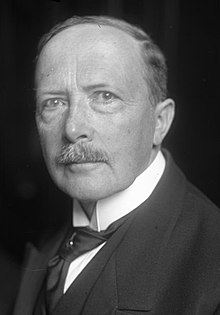Walter Simons
| Walter Simons | |
|---|---|

Walter Simons in 1931
|
|
| President of the Reichsgericht | |
|
In office 1922–1929 |
|
| Personal details | |
| Born |
24 September 1861 Elberfeld, Kingdom of Prussia |
| Died | 14 July 1937 (aged 75) Potsdam, German Reich |
| Spouse(s) | Erna Rühle |
| Relations | Gerhard Simons (grandson) |
| Profession | Lawyer |
| Religion | Lutheran |
Walter Simons (24 September 1861 – 14 July 1937) was a German lawyer and politician. He was Foreign Minister of the Weimar Republic in 1920-21 and served as president of the Reichsgericht from 1922 to 1929.
Walter Simons was born on 24 September 1861 at Elberfeld (today Wuppertal) in the Prussian Rhine Province. His family were Huguenots who had come to the Rhineland after 1685. Walter's father was Ludwig Simons (1831-1905), a silk manufacturer. His mother was Helene Simons née Kyllmann (1842-1916).
Walter Simons attended a Gymnasium at Elberfeld and attained the Abitur in 1879. He went on to study law, economics and history at Strasbourg, Leipzig and Bonn. Rudolph Sohm had an important influence on him. In 1882, he passed the Referendarexamen and then served in the military. In 1888, he passed the Prussian Assessorexamen and then served as an assistant judge at Bonn and Solingen. He married Erna Rühle (1870-1954) at Solingen in 1890. They had three sons and four daughters.
In 1893, Simons became Amtsgerichtsrat (judge) at Velbert. From 1897-1905, he was Landgerichtsrat at the Gemeinschaftliche Landgericht of Thuringia at Meiningen. In 1905, he went to Kiel where he worked at the Oberlandesgericht, but left that same year to work as a clerk at the Reichsjustizamt at Berlin.
In 1907, Simons was promoted to Geheimer Regierungsrat and Vortragender Rat, responsible for international law. He represented the Reich at several international conferences and in 1911 moved to the Auswärtige Amt (Foreign Office) where he became Geheimer Legationsrat and Justitiar. In 1917, he was promoted to Wirklicher Geheimer Rat and in 1918 participated in the negotiations at Brest-Litovsk. On 15 October 1918, shortly before the German Revolution of 1918-19, chancellor Max von Baden made him advisor to the Reichskanzler on issues of international law. He was close to the chancellor and was an important influence on the reform of the German constitution of 1871 known as the Oktoberreformen which strengthened the position of the Reichstag. He also worked on plans to have Wilhelm II resign in favour of a relative and participated in negotiations at the Reichsamt des Innern (Interior Ministry) about a new constitution.
...
Wikipedia
